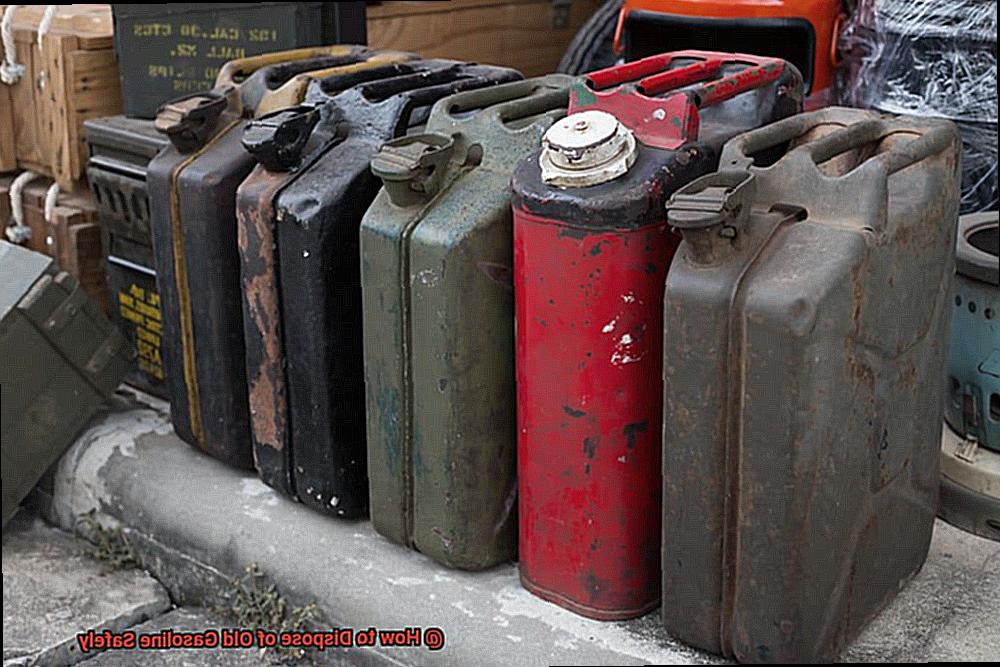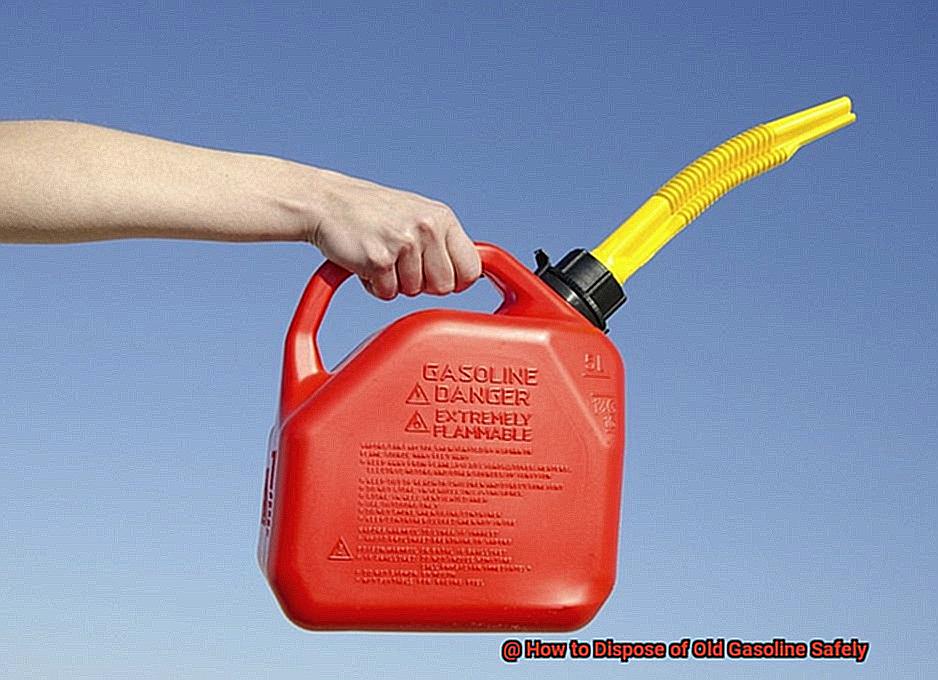Do you have old gasoline that needs to be disposed of? It’s important to take the right steps, as gasoline is highly flammable and can be dangerous. In this blog post, we’ll explore how to dispose of it safely.
We’ll cover topics such as improper disposal, how to identify expired fuel, and the correct ways to get rid of old gasoline. Plus, we’ll have advice on how to handle containers with fuel residue and how to avoid future leaks.
By following these tips, you can ensure your gas removal process is safe and efficient. So whether you’re dealing with one container or multiple drums full of expired fuel, this blog post will provide all the information you need. Read on to learn more about disposing of old gasoline safely.
Is Two-Year-Old Gasoline Still Good?
Contents
- 1 Is Two-Year-Old Gasoline Still Good?
- 2 How to Dispose of Old Gasoline Safely
- 3 What Can You Do with Stale Gasoline?
- 4 Can I Let Old Gas Evaporate?
- 5 Should I Pour It Out on the Ground?
- 6 How Do You Dump Gas?
- 7 What Are the Local Regulations for Disposing of Old Gasoline?
- 8 Additional Tips for Safely Disposing of Old Gasoline
- 9 Conclusion
You should be aware that gasoline will have degraded significantly after two years and will no longer be safe to use in engines. But don’t worry—there are still ways to use it safely.
When dealing with old fuel, it is essential to take the necessary safety precautions. This includes wearing protective gear, avoiding sparks and open flames, and properly disposing of the old fuel. With these steps in mind, two-year-old gasoline can still be used for other purposes, such as cleaning or starting a fire.
Fresh gasoline is always best, but if you’re stuck with old gas, there are ways to make it work.
How to Dispose of Old Gasoline Safely
Old gasoline is a highly flammable material that can be dangerous if not handled with care. To protect yourself, your family, and the environment, it is essential to take the right steps when disposing of old fuel. Here are some tips on how to do so safely and responsibly.
The best way to get rid of old gasoline is to take it to a hazardous waste collection center or a local recycling center. Before heading out, make sure you have all the necessary information about the type and amount of fuel you are disposing of so they can process it properly. Never pour gasoline down a drain or into the ground, as this will contaminate the water supply and cause environmental damage.
Do not attempt to burn any remaining fuel, as this can be hazardous and lead to air pollution.
If you have only a small quantity of old gasoline, you can dilute it with kitty litter, sawdust, or sand before disposing of it in an appropriate container. Make sure that you label any containers that contain gasoline and keep them away from children and pets.
Additionally, always wear protective clothing and gloves when handling any sort of fuel, and work in well-ventilated areas for your own safety.
Another option for getting rid of old gas safely is to donate your used fuel to a mechanic shop or recycling center that accepts used fuel. However, before donating any fuel, make sure it is first approved by your local waste management department.
It’s important to remember that following all safety protocols when handling and disposing of old gasoline is paramount in order to prevent accidents from occurring and safeguard the environment from hazardous materials.
What Can You Do with Stale Gasoline?
Stale fuel can still be used in some circumstances, such as for lawn mowers, chainsaws, and other small engines. However, before using it, make sure the fuel is still viable by using a hydrometer or fuel stabilizer. If the gasoline is still good, use it right away!
On the other hand, if it’s no longer viable, dispose of it properly at a hazardous waste facility or have a licensed professional take care of it.
Can I Let Old Gas Evaporate?
The answer is simple: don’t let it evaporate! The evaporation of gasoline can have serious consequences for your health and the environment.
Gasoline contains volatile organic compounds (VOCs) that are released into the air when it evaporates. These VOCs can cause respiratory problems and other health issues, as well as contributing to ground level ozone, which is a major component of smog.
Moreover, the evaporation of old gasoline can lead to soil contamination and groundwater pollution if not disposed of correctly. To avoid these potential risks, take your old gasoline to a recycling center or hazardous waste facility for proper disposal.
Should I Pour It Out on the Ground?
Pouring gasoline on the ground is never recommended. Not only is it illegal in most places, but it can also lead to serious environmental damage. Gasoline contains harmful toxins that can seep into the soil and water, posing a potential health risk to humans and animals alike. Furthermore, gasoline is highly flammable, so pouring it on the ground could create a hazardous situation.
The best way to dispose of old gasoline is by taking it to a certified recycling center or hazardous waste facility. These facilities are equipped with the right equipment and personnel to ensure that the gasoline is disposed of safely and properly. If you need help finding a disposal site, contact your local fire station or police department for assistance.
How Do You Dump Gas?
Gasoline is a potent and hazardous substance, and it’s essential to handle it with caution. Dumping gasoline on the ground or in a body of water is illegal and can cause significant damage to the environment. To dispose of gas responsibly, you should take it to a hazardous waste collection center, a service station, or an auto shop that will accept old gasoline for disposal.
Before disposing of the gas, make sure to store it in an approved container. When transporting the fuel, ensure that it is secure and cannot spill out onto the road or into nearby water sources. Wear protective gear such as gloves, goggles, and a face mask when handling gasoline for extra safety.
What Are the Local Regulations for Disposing of Old Gasoline?
It’s essential to be aware of local regulations, as they can vary from state to state. To make sure you’re disposing of old fuel safely and legally, check with your local government for guidelines.

Depending on where you live, you may be able to take it to a fuel station or a car repair shop. If you need help with large quantities of gasoline, contact a hazardous waste management company.
Additionally, pouring old gas down the drain or into sewers is illegal in some areas due to the potential contamination of water sources and environmental damage.
Before taking any action, be sure to research your local regulations regarding the disposal of old gasoline.
Additional Tips for Safely Disposing of Old Gasoline
When handling fuel, it’s essential to always wear the right safety gear. Gloves, goggles, and a respirator are all necessary items to protect yourself from any potential accidents or leaks.
It’s also important to make sure that any container used to store or transport fuel is properly labeled and sealed in order to ensure your own safety and that of those around you.
Remember that gasoline vapors can be highly flammable and explosive, so taking extra precautions when handling them is essential.
Old Gasoline
Old gasoline should never be discharged in an open area such as a field or roadside. Instead, contact your local hazardous waste disposal center to find out if they accept gasoline for disposal.
If you have an old vehicle that needs to be disposed of, make sure you drain all of the gas before taking it to the junkyard or scrap yard.
You may also consider donating your old gas cans or containers to a local charity or organization that may be able to use them for various projects or activities.
It is also important not to pour gasoline directly into a drain or sewer system, as this will contaminate the environment and create hazardous conditions for people and animals nearby. In addition, pouring gasoline down a drain can result in blockages in pipes, which could lead to costly repairs and clean-up fees.
Disposal of Old Gasoline
Before disposing of old gasoline, it is important to check with your local government about their regulations regarding its disposal, as these guidelines can vary from state to state and city to city.
Knowing these guidelines ahead of time will help ensure that you are disposing of your old gas safely and legally.
In addition, several states may have incentives for recycling old gas cans, so be sure to investigate this option if it’s available in your area.
Contacting the Local Fire Department for Large Amounts of Gasoline
If you have large amounts of old fuel that need disposing of, contact your local fire department, which will be able to provide proper disposal instructions based on your location and situation.
The fire department may also have special collection days at certain times throughout the year where you can transport large amounts of old fuel for safe disposal at no cost.
Additional Tips for Safely Disposing of Old Gasoline
In addition to following the above tips when disposing of old gasoline, there are other things you can do, such as making sure that any container used is approved for storing flammable materials and never pouring gasoline into a sewer or storm drain.
Also remember not to leave any containers full of fuel unattended, as this could lead to dangerous accidents if someone were to accidentally knock them over or tamper with them without knowing what was inside them!
Conclusion
Disposing of old gasoline is a serious issue and should never be taken lightly.
To ensure safety, wear protective gear, avoid sparks and open flames, and properly dispose of the fuel.
Check local laws for information on legal disposal methods. The best option is to transport it to a hazardous waste collection center or a local recycling center.
Never pour gasoline down a drain or into the ground, as this will contaminate the water supply and cause environmental harm. If you have only a small amount of old gasoline, you can dilute it with kitty litter, sawdust, or sand before disposing of it in a suitable container.
When buying any containers used for storing fuel, make sure to purchase them from an approved location away from children and pets.
Additionally, do not allow gasoline to evaporate, as this will release volatile organic compounds into the air, which can cause respiratory difficulties and other health problems.
Always wear protective clothing and gloves when handling any sort of fuel, and work in well-ventilated areas for your own protection.





